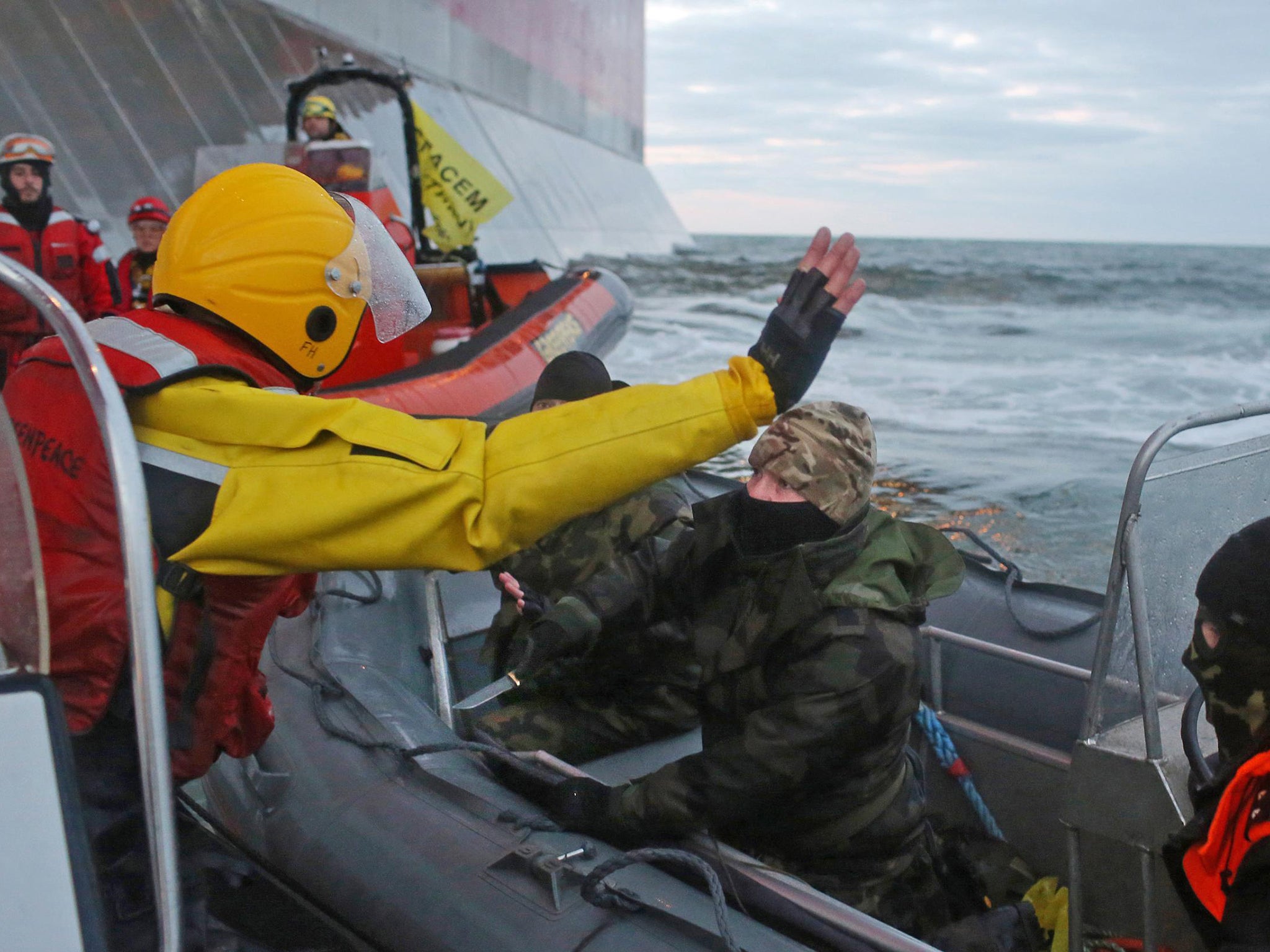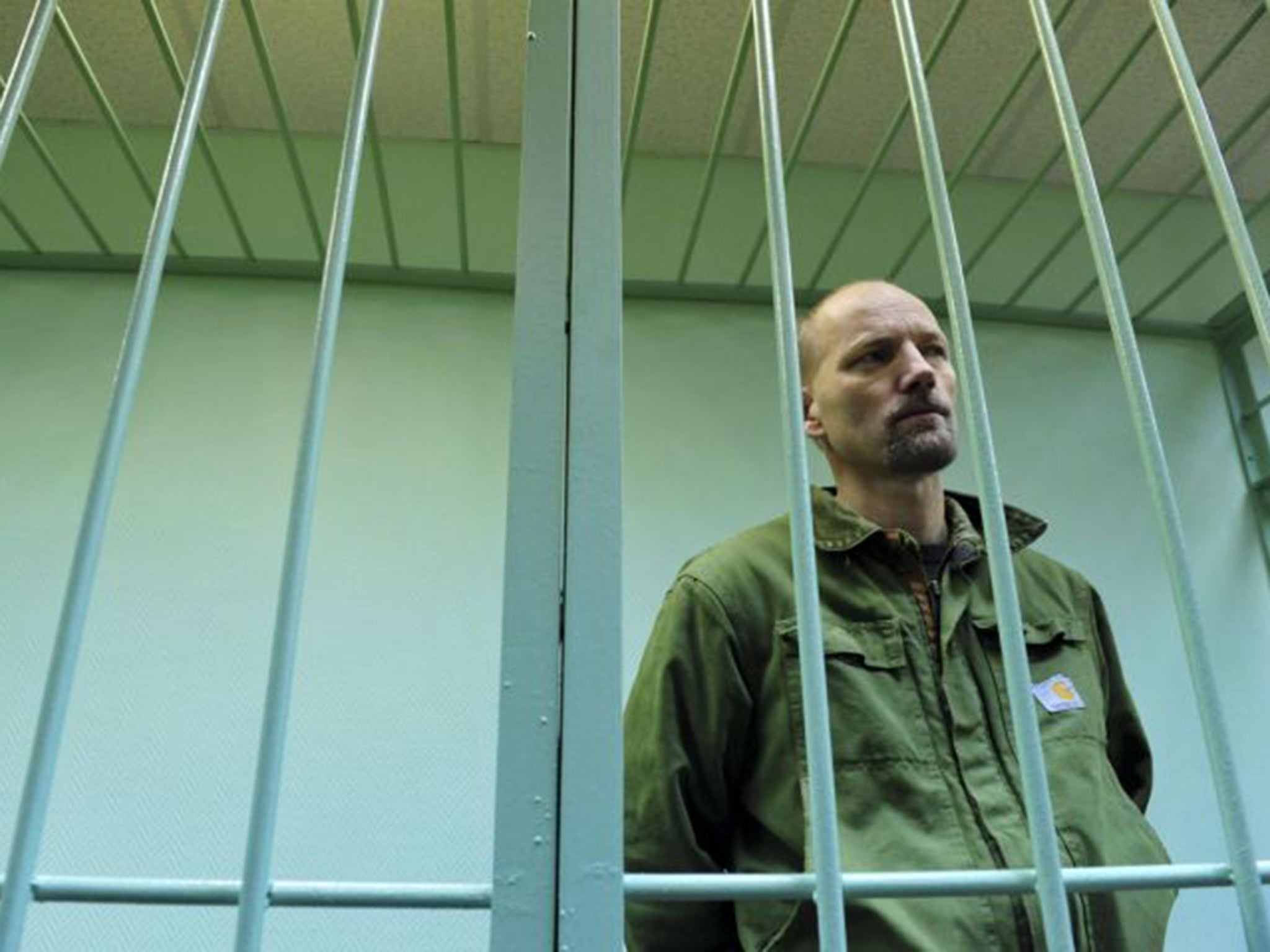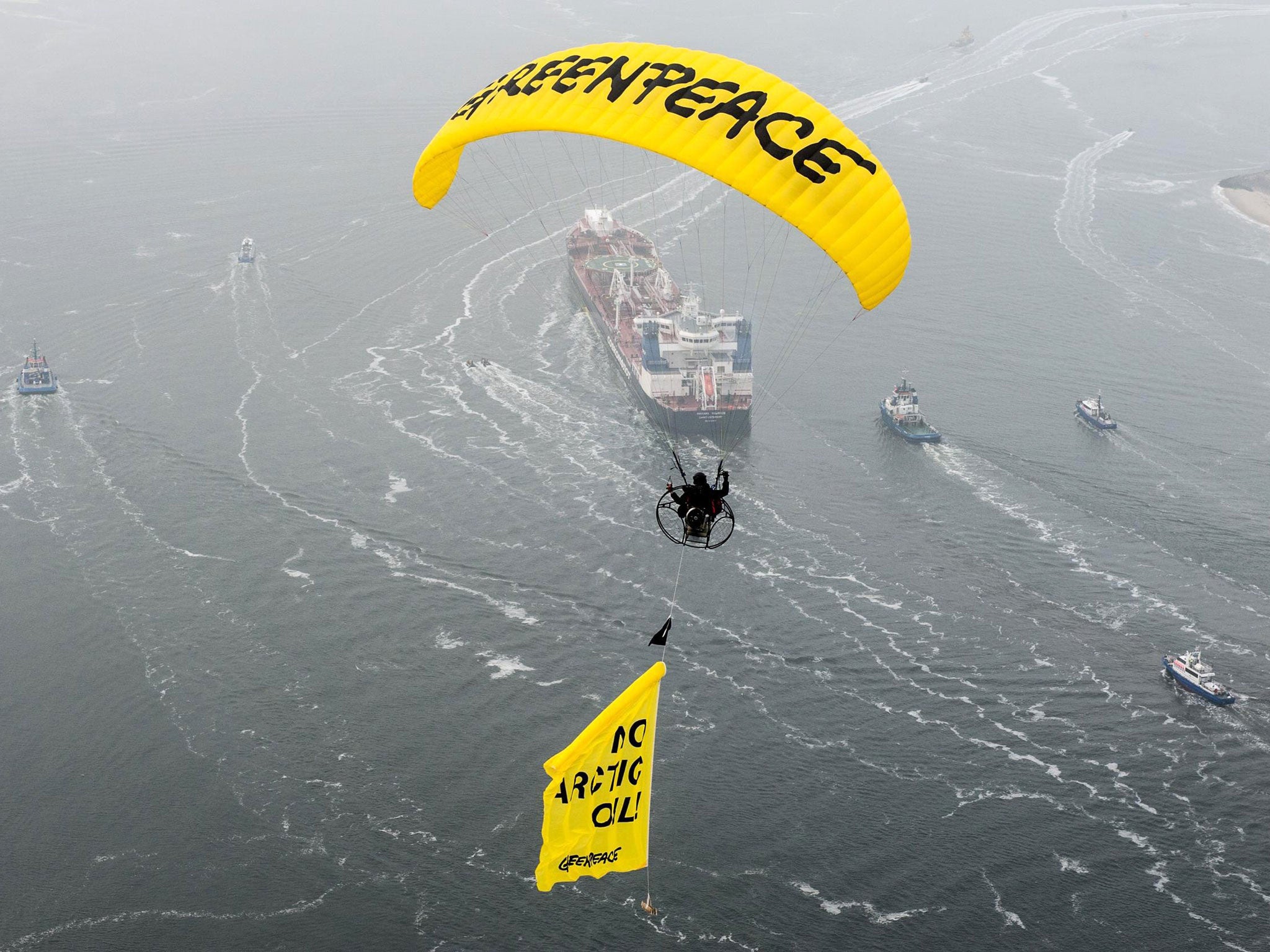When Russia declared war on Greenpeace: The story of the Arctic 30 captured on a Gazprom drilling platform and sentenced to years in jail
A brilliant new book by Ben Stewart recalls the global campaign to free the activists. In this extract, he hears from Frank Hewetson, who wrote at the time to The Independent on Sunday about his ordeal

Your support helps us to tell the story
From reproductive rights to climate change to Big Tech, The Independent is on the ground when the story is developing. Whether it's investigating the financials of Elon Musk's pro-Trump PAC or producing our latest documentary, 'The A Word', which shines a light on the American women fighting for reproductive rights, we know how important it is to parse out the facts from the messaging.
At such a critical moment in US history, we need reporters on the ground. Your donation allows us to keep sending journalists to speak to both sides of the story.
The Independent is trusted by Americans across the entire political spectrum. And unlike many other quality news outlets, we choose not to lock Americans out of our reporting and analysis with paywalls. We believe quality journalism should be available to everyone, paid for by those who can afford it.
Your support makes all the difference.Frank Hewetson is lying on the upper bunk of a prison cell in the Russian Arctic, waiting impatiently for the Valium tablet to kick in. He’s wearing woollen tights, two pairs of socks, three T-shirts, a pullover, a skull-gripping hat and earplugs. The hot incandescent bulb dangling from a wire above his head has just been switched off by the guards, and Murmansk SIZO-1 isolation jail is stirring.
He can hear boots stomping above his head, prisoners thumping the walls in cells down the corridor, the distant sound of screaming. Across the prison, windows are swinging open and ropes are being fed through bars, then lowered down the outside walls or swung from cell to cell. Frank pulls a blanket up around his neck and holds himself against the cold biting air.
He is 48, he has a wife and two children back in London. and he’s charged by the Russian state with piracy – a crime that carries a minimum sentence of 10 years in a country where 99 per cent of all trials end in a guilty verdict.
One of his cell mates, Boris, is bent at the waist and pressing his ear against the plughole of the sink, strained concentration on his face. Boris is short with olive skin, muscles like marble, a permanent wrap of stubble on his face and a hairline that nearly merges with his eyebrows. He’s charged with double manslaughter.

Frank’s other cell mate, Yuri (multiple counts of assault by Taser), is feeding a rope out the window. He is younger than Boris, sallow skin and greasy black hair. Minutes from now this rope network, known as the doroga – “the road” – will connect almost every cell along the outside walls of the jail, allowing prisoners to communicate with each other and share contraband. It is a physical internet through which power is projected and justice dispensed by the mafia bosses who control much of this place.
Thank Christ for those drugs. Every night the pills allow him to slip into something approaching sleep. He secured them five weeks ago after experiencing what the authorities thought was a cardiac arrest but which was, in reality, a panic attack brought on by the prospect of spending 10 to 15 years in a Russian jail.
Boris stands up straight. “Frank,” he hisses. “Come come come. Frank!”
Frank closes his eyes, pretending to sleep, but a moment later he can feel Boris’s breath on his face. It smells of potatoes and fish-head soup.“Fraaaank. Come, come.” “Boris, p*** off and leave me alone, all right.” “Come, Frank. Come.”
He’s pointing towards the sink. Boris slaps him on the back then leads him over to the sink. Yuri ties off the rope, kneels down under the sink and starts unscrewing the U-bend. Boris kneels down next to him and together the two Russians strain hard, pulling the pipe away from the wall until – with a scraping metallic pop – it comes clear.
“Frank, sit.” The air is filled with thumping and banging as the rope network comes alive. Soon the prisoners will be using it to share illicit letters, sugar, mobile telephones, an underground satirical newspaper and perfumed cigarettes given as gifts by prisoners to lovers they have never met and never will.
His cell mates are staring at him with imploring eyes. Boris is clutching the liberated U-bend like it’s a glass of beer.
Slowly, hesitantly, Frank lowers himself to the ground then Boris pushes Frank’s head down, at the same time twisting the U-bend until it’s pressed against his ear. Frank’s eyes swivel in their sockets; he’s about to say something when he hears a faint tinny voice.
“Allo? Dis is prisoner boss Andrey Artamov in cell four-one-zero. Is dat the Arctic firty?”
Frank gulps. “Er… ” He hesitates then puts his mouth to the end of the tube. “Er… yes. Well, one of them.”
“I have friend of you here.” Silence, then, “Hello, Frank? This is Roman Dolgov, your Greenpeace compatriot from the cell above you.”
“Er… hello, Roman. You seem to be somewhere in my U-bend system. How did you fit down there?”
“Ha ha, yes, this is funny. This is prison telephone. I have to tell you, Frank, we have a problem.”
Afterwards Frank clambers back onto his bunk staring at the ceiling. An illegal telephone network fashioned from the prison plumbing system? Mafia bosses issuing orders through a U-bend? And this isn’t even the strangest thing that’s happened in the last two months.
“Christ,” Frank whispers to himself, shaking his head. “How the f*** did I end up here?”
***
Frank Hewetson has been sailing with Greenpeace for two decades. Banned from the United States for crimes of moral turpitude, he’s broken into seven polluting power stations in four countries, and he once blocked the take-off of a BA jet at Heathrow in a climate-change protest. Three years ago he was skewered by a grappling hook while protesting illegal bluefin tuna fishing. After 20 years leading direct action teams across the globe, he is the go-to guy if you want to scale an enormous piece of machinery being operated by a powerful company with a multi-million-dollar security operation.
***

At 3.30am the crew is clustered together, whispering, checking the plan and checking again. “OK,” Frank announces. “Everybody!” They look up, expectantly. A pause, then, “We’re doing it.”
In front of him, climbers are standing face to face, checking the other’s kit one last time. Frank needs these two to perform today. If they can get up the side of Gazprom’s Prirazlomnaya oil rig and hold their position, this thing might happen. Slowly, silently, the first rigid-hulled inflatable boat (RHIB) is slipped into the water. The inflatable bow of the boat lifts and suddenly they’re tearing around the Sunrise into open water. Ahead a spotlight breaks the dawn. It comes from the coastguard ship Ladoga and within seconds it’s sweeping across the water towards them.
There’s a crackle of static, then, “This is a peaceful action, a non-violent protest against oil drilling and the threat it represents to the Arctic environment and to the climate. There is no risk of damage to your property, we are in unarmed boats, we are not going to attempt to take over your platform. This is a peaceful protest.” An officer on the Ladoga breaks in. “Arctic Sunrise, halt all activity. Raise your boats!”
The Russian RHIBs are in the water now, but the activists’ boats are already pulling up under the platform. It’s huge, 120 metres long on each side.
The first climber’s a second or two from clipping in and starting the climb when the Russian RHIB tears around the side of the platform. It ploughs directly into their boat. Silence, a static buzz, then Frank’s voice on the radio. “All boats to the platform. All boats!”

A few minutes later they’ve joined the action and, through a spray of water, two Russian boats carrying soldiers wearing black balaclavas over their faces, bodies camouflaged can be clearly seen. Suddenly one of them pulls a knife and lunges at the video-cameraman, trying to grab his camera, but it is attached to him by a cord. If the guy gets hold of it the cameraman is going to be pulled out of the boat.
The Russian falls short, he leans down and stabs the RHIB’s rubber inflatable rim, then he reaches for his hip and pulls a gun.
***
Frank Hewetson and 29 other Greenpeace activists protesting against Gazprom’s oil drilling in the Arctic were arrested by the Russian authorities and detained in custody in October 2013. State investigators charged more than 20 of them with piracy, although this was later changed to aggravated hooliganism. An international campaign was launched to free them, which included demonstrations outside Russian embassies, and 11 Nobel laureates writing to Russian President Putin calling for clemency.
On 24 December 2013, the first of the detainees, Briton Anthony Perrett, was freed under an amnesty law passed by the Russian parliament. Frank Hewetson was freed on Christmas Day.
Extracted from 'Don’t Trust, Don’t Fear, Don’t Beg: The Extraordinary Story of the Arctic Thirty' by Ben Stewart, which is published in paperback by Guardian Faber (£12.99)
Join our commenting forum
Join thought-provoking conversations, follow other Independent readers and see their replies
0Comments